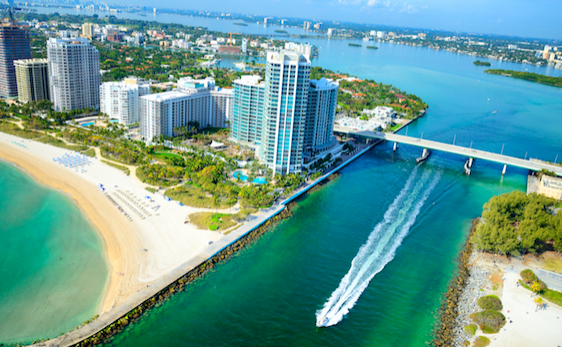The city of Miami is no stranger to suspicious all-cash transactions. A U.S. Department of Treasury pilot program that monitors suspicious all-cash real estate purchases shows that the city’s reputation for such transactions has not diminished, according to a recent Mansion Global report.
Nearly a year after the Treasury began monitoring all cash-sales of Miami-area homes over $1 million, what the program found is that Miami has the highest rate of suspicious foreign buyers out of every city nationwide, according to Mansion Global. Exactly 50 percent of Miami’s all-cash sales — 16 out of 32 — are considered suspicious, the publication reports. Palm beach had two of its four home sales that qualified for extra scrutiny marked as suspicious.
The report also compared cities based on how many suspicious transaction reports each saw — as well as how many foreign buyers used shell companies to complete all-cash luxury transactions — from Feb. 29, 2016 to March 9, 2017. According to the data chart, Miami tops all of the nation’s major areas such as Manhattan and Southern California — places known to have a history of suspicious transactions as well.
Extra scrutiny needed
The Treasury Department’s Financial Crimes Enforcement Network officially started the program Feb. 29, 2016 before eventually expanding it to other cities across the country. It was launched so that federal officials could get a handle on the influx of mostly international buyers scooping up luxury properties without financing, and possibly laundering money in the process.
The problem started during the Great Recession, which caused home values in Miami and elsewhere to plummet. International investors began buying the cheaper units, and in some cases used “dirty” money for the purchase. In 2009, cash sales accounted for at least 50 percent of all home sales for 75 consecutive months.
One of the most notable transactions occurred when Venezuelan vice president Tareck El Aissami purchased $7 million worth of luxury property at Miami condo tower, according to Mansion Global. The vice president used funds acquired through narcotic trafficking to buy 8,600 square feet of space in the building. According to the article, this is exactly the type of shady transaction the program has hoped to uncover throughout its tenure.
Cash sales dropping
All-cash sales are still a problem in Miami, but the situation has changed since the post-recession days.
Miami is the No. 2 market for fraudulent home purchases, with Ft. Lauderdale coming in first, according to CoreLogic’s 2017 Market Health Indicator. It’s status as a high-fraud market is in part driven by the volume of all-cash sales, and that’s a primary reason the markets are considered high-risk for investors and buyers, according to CoreLogic.
But there has been some good news on this front. As of April 2017, Miami’s cash sales have significantly dropped since the start of the pilot program. Cash transactions totaled 39 percent of the market in April, compared to 489 percent in April of last year, according to the Miami Association of realtors. That’s still twice the national average, however.
The Treasury’s program has come under scrutiny for casting too-wide of a net in monitoring all sales over $1 million. The Miami Association of Realtors touts the area’s cash sales as proof that wealthy residents and investors are still bullish on the market. Despite that, it’s clear that the Fed’s program has so far proven successful.

